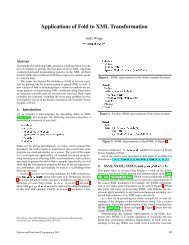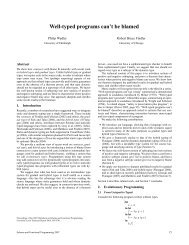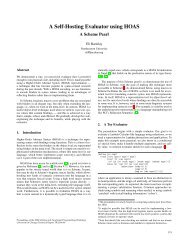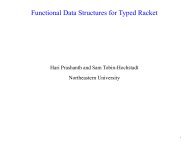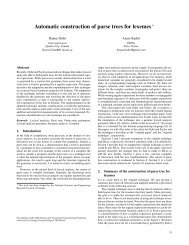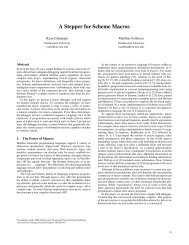2006 Scheme and Functional Programming Papers, University of
2006 Scheme and Functional Programming Papers, University of
2006 Scheme and Functional Programming Papers, University of
Create successful ePaper yourself
Turn your PDF publications into a flip-book with our unique Google optimized e-Paper software.
parsing benchmark’s computer-generated lexical analyzer<br />
<strong>and</strong> parser are not outrageously inefficient.<br />
Both the state machine <strong>of</strong> the lexical analyzer <strong>and</strong><br />
the recursive descent parser were generated by the author’s<br />
LexGen <strong>and</strong> ParseGen, which can generate lexical<br />
analyzers <strong>and</strong> parsers written in <strong>Scheme</strong>, Java,<br />
or C [2]. This made it fairly easy to translate the<br />
parsing benchmark into Java. As it was not obvious<br />
whether the strings <strong>of</strong> the <strong>Scheme</strong> benchmark should<br />
be translated into arrays <strong>of</strong> char or into instances <strong>of</strong> the<br />
StringBuilder class, two versions <strong>of</strong> the Java code<br />
were written; a third version, just for grins, uses the<br />
thread-safe StringBuffer class.<br />
The timings reported in the next section for the<br />
casing, lexing, parsing, <strong>and</strong> reading benchmarks<br />
were obtained by casing, lexing, parsing, or reading the<br />
nboyer benchmark one thous<strong>and</strong> times [2].<br />
5. Benchmark Results<br />
Tables 1 <strong>and</strong> 2 show execution times for the benchmarks,<br />
in seconds, as measured for several implementations<br />
on an otherwise unloaded SunBlade 1500 (64-bit,<br />
1.5-GHz UltraSPARC IIIi). Most <strong>of</strong> the timings represent<br />
elapsed time, but a few <strong>of</strong> the slower timings<br />
represent CPU time. For the compiled systems <strong>and</strong> the<br />
fastest interpreters, the timings were obtained by averaging<br />
at least three runs. For the slower interpreters, the<br />
reported timing is for a single run.<br />
For the two largest case micro-benchmarks, three<br />
<strong>of</strong> the <strong>Scheme</strong> compilers generated C code that was too<br />
large or complex for gcc to h<strong>and</strong>le.<br />
From table 1, it appears that compilers C <strong>and</strong> D use<br />
sequential search for all case expressions. Compilers<br />
B, E, <strong>and</strong> F generate efficient code when dispatching<br />
on fixnums, but appear to use sequential search for<br />
symbols.<br />
Compiler A (Larceny v0.92) has the best overall performance<br />
on the micro-benchmarks, <strong>and</strong> Compiler B<br />
(Larceny v0.91) is next best. The difference between<br />
them is that Larceny v0.92 implements case expressions<br />
as described in this paper.<br />
Table 2 shows that, for the parsing benchmark,<br />
most <strong>of</strong> these implementations <strong>of</strong> <strong>Scheme</strong> spend roughly<br />
half their time in case dispatch. The two that spend the<br />
least time in case dispatch, compilers F <strong>and</strong> B, perform<br />
well on the fixnum case micro-benchmarks <strong>and</strong> appear<br />
to be doing well on the parsing benchmark’s character<br />
dispatch also. Compiler C’s performance may mean<br />
sequential search is fast enough for this benchmark, or<br />
it may mean that compiler C recognizes case clauses<br />
that match sets <strong>of</strong> consecutive characters (such as #\a<br />
through #\z, #\A through #\Z, <strong>and</strong> #\0 through #\9)<br />
<strong>and</strong> tests for them using a range check instead <strong>of</strong> testing<br />
individually for each character.<br />
The difference between Larceny v0.92 <strong>and</strong> v0.91<br />
(compilers A <strong>and</strong> B) does not matter for the parsing<br />
benchmark, because v0.91 was already generating efficient<br />
code for case dispatch on characters.<br />
6. Related Work<br />
Compilers for mainstream languages typically implement<br />
case/switch statements using sequential search,<br />
binary search, or jump tables [6].<br />
A binary search usually concludes with a jump to<br />
code for the selected case. In the subset <strong>of</strong> <strong>Scheme</strong><br />
that serves as Twobit’s main intermediate language,<br />
jumps are best implemented as tail calls. Those calls<br />
would interfere with many <strong>of</strong> Twobit’s intraprocedural<br />
optimizations, so Twobit does not use a single-level<br />
binary search.<br />
Jump tables are hard to express in portable <strong>Scheme</strong><br />
without using case expressions, which are not part<br />
<strong>of</strong> Twobit’s intermediate language. Adding even a restricted<br />
form <strong>of</strong> case expressions to Twobit’s intermediate<br />
language is unattractive, because it would complicate<br />
most <strong>of</strong> Twobit’s other optimizations.<br />
Jump tables can be implemented portably using a<br />
vector <strong>of</strong> closures, but it would cost too much to create<br />
those closures <strong>and</strong> to store them into a vector every time<br />
the scope containing a case expression is entered. A<br />
vector <strong>of</strong> lambda-lifted closures could be created once<br />
<strong>and</strong> for all, but would entail the costs <strong>of</strong> passing extra<br />
arguments <strong>and</strong> <strong>of</strong> making an indirect jump. With either<br />
form <strong>of</strong> jump table, calling a closure that cannot be<br />
identified at compile time would interfere with many<br />
<strong>of</strong> Twobit’s intraprocedural optimizations.<br />
The Orbit compiler demonstrated that it is practical<br />
to macro-exp<strong>and</strong> case expressions into if expressions,<br />
<strong>and</strong> for control optimization to recognize <strong>and</strong> to generate<br />
efficient code from those if expressions [7].<br />
Acknowledgments<br />
The author is grateful to the anonymous reviewers, not<br />
only for remarks that improved this paper, but also for<br />
suggestions that improved the implementation <strong>of</strong> case<br />
expressions in Larceny v0.92 [4].<br />
<strong>Scheme</strong> <strong>and</strong> <strong>Functional</strong> <strong>Programming</strong>, <strong>2006</strong> 67




